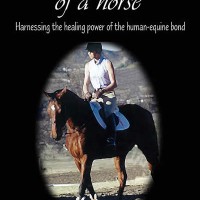
Although equine therapy has been used for a wide variety of psychological and behavioral conditions, and weight loss has been attacked from seemingly every possible angle, is it possible that working with horses can somehow hold benefit for those struggling with weight?
To be sure, losing weight is its own animal, and own that is not so easily tamed. Much of the reason for this is that it is a very complex psychological condition that is often addressed physically. Yet the strong emotional, cognitive and behavioral precursors and underpinnings of being heavy are often not so easily overcome. After all, it is much easier to swallow a pill, or follow a diet than actually figure why the weight may have come on in the first place.
And yet the conditions of overeating and obesity do share several psychological factors that, in many ways, are prime subjects for equine therapy. Let’s look at these more closely.
* Repression of emotions
Those who turn to food for something other than hunger, therefore resulting in weight gain, tend to be much less emotive than there slim counterparts. While they may be quite expressive regarding their feeling for things outside of themselves (such as friends, family, work, etc.), when it comes to their feelings about themselves, they are typically quite reserved. And sometimes, with weight gain, people may even feel less able to express themselves about any subject over time as they may feel as though they do not have the right, or do not want to draw attention to themselves. In this way, emotions that arise are stifled in increasing amounts with additional weight gain.
* Poor emotional tolerance
As a heavy person becomes less emotive and holds in more emotion, the ability to tolerate intense emotions becomes inhibited. As they is not place to voice these feelings and therefore find some resolution for them, the managing them becomes ever more challenging. In time, what may be a slight frustration for a person not struggling with weight can be very trying for a heavy person.
* Detachment from others
When a person emotes less over time, and represses more, his/her relationships begin to suffer. Without sharing deep fears, dreams, worries, and frustrations with close friends and family, those around the heavy person begin to feel as though they may not know him/her. On the other hand, the heavy person himself/herself may also feel as though no one knows him/her well enough to offer help. Often, the relationship with food becomes the most prominent and telling relationship in the person’s life.
* Detachment from self
Without the emotional closeness that comes from disclosing what is tight to the vest, any person can lose a sense of his/her sense of self. What another person with whom one feels she/he can share emotions freely without judgement or repercussion provides is an indispensable sounding board that fosters self-awareness. Absent this, a heavy person can lose touch with what is happening under the surface, and in addition to this, the more self-awareness is avoided through the relationship with food, the more difficult it will be to grasp, as time goes on.
Given these circumstances, it is easy to see that a person who struggles with weight may shy away from any transparent relationship, and especially that with a therapist. With good reason, heavy people often fear the judgement of another person, and find relationship all together not very safe. However, without this basic trust of other people, finding help for the emotional components of weight gain will obviously be very difficult.
Yet horses bring no such judgement, and respond to what is hidden underneath the layers in a way that is clear, and does not bear the burden of fear that comes with another person. And horses do not guess either. While a therapist may make an assumption about the way a person feels about his/her weight, a horse simply responds the physiological remnants of emotion — hidden or not. Further, horses do not allow detachment the way people do, it is simply not in their nature. Instead, their survival depends on the ability to use communication to build trust, rapport and safety — often the very things that are lost with weight gain.